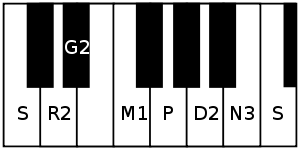Gourimanohari
Gowrimanohari or Gaurimanohari is a rāgam in Carnatic music (musical scale of South Indian classical music). It is the 23rd Melakarta rāgam in the 72 melakarta rāgam system of Carnatic music. The 23rd melakarta rāgam as per Muthuswami Dikshitar school of music is Gourivelāvaḻi.
| Arohanam | S R₂ G₂ M₁ P D₂ N₃ Ṡ |
|---|---|
| Avarohanam | Ṡ N₃ D₂ P M₁ G₂ R₂ S |
| Equivalent | Melodic minor scale |
| Carnatic music |
|---|
Tanjavur-style Tambura |
| Concepts |
| Compositions |
| Instruments |
|
The Western equivalent is the melodic minor scale.
Hindustani music does not have an equivalent to this rāgam, where the purvanga (first half of the scale) is like Kafi thaat, while the uttaranga (second half) is like Bilaval thaat.[1]
Structure and Lakshana

It is the 5th rāgam in the 4th chakra Veda. The mnemonic name is Veda-Ma. The mnemonic phrase is sa ri gi ma pa dhi nu.[2] Its ārohaṇa-avarohaṇa structure (ascending and descending scale) is as follows (see swaras in Carnatic music for details on below notation and terms):
- ārohaṇa: S R₂ G₂ M₁ P D₂ N₃ Ṡ[lower-alpha 1]
- avarohaṇa: Ṡ N₃ D₂ P M₁ G₂ R₂ S[lower-alpha 2]
The notes used in this scale are shadjam, chatushruti rishabham, sadharana gandharam, shuddha madhyamam, panchamam, chatushruti daivatam and kakali nishadham. It is a sampurna rāgam – a rāgam that has all seven swaras (notes). It is the shuddha madhyamam equivalent of Dharmavati, which is the 59th melakarta.
Janya rāgams
It has a few minor janya rāgams (derived scales) associated with it. See List of janya rāgams to look up all rāgams associated with it.
Popular compositions
The following are a few popular compositions in this rāgam.
- Guruleka etuvanti by Thyagaraja
- Varalakshmi Namostute by Mysore Vasudevacharya
- Sarasa sama mridu pada by Swati Tirunal
- Brova Samayamide Ramayya by Karur Devudu Iyer
- Gangadhara Shiva by Sri Ganapathy Sachchidananda Swamiji
Film Songs
Language:Tamil
Related rāgams
This section covers the theoretical and scientific aspect of this rāgam.
Gourimanohari's notes when shifted using Graha bhedam, yields 3 other major melakarta rāgams, namely, Vachaspati, Natakapriya and Charukesi. Graha bhedam is the step taken in keeping the relative note frequencies same, while shifting the shadjam to the next note in the rāgam. For further details and an illustration see Graha bhedam on Vachaspati.
Notes
- Alternate notations:
- Hindustani: S R G̱ M P D N Ṡ
- Western: C D E♭ F G A B C
- Alternate notations:
- Hindustani: Ṡ N D P M G̱ R S
- Western: C B A G F E♭ D C
References
- Raganidhi by P. Subba Rao, Pub. 1964, The Music Academy of Madras
- Ragas in Carnatic music by Dr. S. Bhagyalekshmy, Pub. 1990, CBH Publications